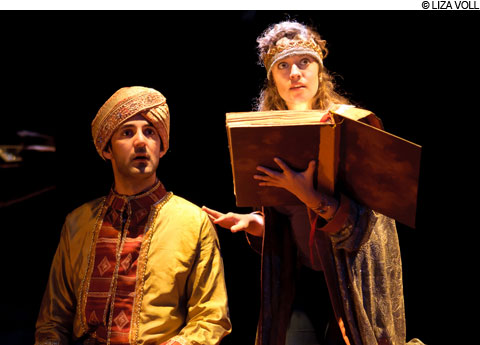
MAGIC CARPET RIDE The tales of these “Arabian Nights” include appearances by Flaubert and
Borges. |
Jason Grote's swirling sandstorm of political topics interwoven with pieces of tales from One Thousand and One Nights is not for everyone. At the performance I attended of Company One's staging of Grote's 2007 work (at the BCA's Calderwood Pavilion through August 13), a couple of audience members walked out in a huff, likely offended by the play's inclusion of a cartoonish Osama bin Laden who quoted the final monologue in Michael Jackson's "Thriller" while laughing maniacally.That scene is the closest Grote comes to taking a political stance — and the play doesn't adhere to any one plotline, either. Grote uses the same framing device as the original One Thousand and One Nights, which begins with Shahriyar (Nael Nacer) discovering his wife's infidelity and deciding that the only way to prevent his future wives from cheating is to marry virgins, deflower them, and execute them the next morning. But the one thousand and first virgin to marry Shahriyar (in this telling) has a clever survival tactic: Scheherazade (Lauren Eicher) begins telling a new suspenseful story each night, leaving it unfinished, thus convincing him to keep her alive so he can hear her stories' endings.
But Grote is a regular Scheherazade himself, never allowing us to fully immerse ourselves in any one story before switching to another. The playwright has juxtaposed a second plot framing device with Scheherazade's and Shahriyar's: the story of Alan and Dahna, a New York Jew and a Palestinian activist. The two meet and fall in love in Manhattan shortly before the fall of the twin towers; Nacer and Eicher play both couples. These two plotlines are also interwoven with Scheherazade's stories, acted out by the rest of the cast. Each section is introduced by a turban-clad One-Eyed Arab narrator (Ben Gracia). As the stories devolve into non-linear order, the narrator's guidance becomes essential. After all, this Scheherazade is inexplicably familiar with the works of Flaubert and Borges.
Throughout, pieces of Manhattan spill over into ancient Arabia, and vice versa. Before the audience is even introduced to Alan, we notice the Sultan channeling him, remarking that Scheherazade looks like his girlfriend, and sprinkling his royal speechifying with modern Americanisms. The magical realism of Scheherazade's tales trickles into contemporary New York as well when Dahna receives a lamp in the mail — in the modern story's climax, Alan calls on the djinn inside of it to grant him one wish.
Megan Sandberg-Zakian has let her six actors run wild with Grote's script, which calls for each of them to plunge into multiple, distinctly defined roles. Dialect coach Liz Hayes has diligently guided the players, from the cocktail of various Middle Eastern accents to Ben Gracia's impersonation of Alan Dershowitz, Ruby Rose Fox's lisping Princess Maridah, the thick drawls of Hampton Fluker's Gustave Flaubert and Lonnie McAdoo's Jorge Luis Borges. Costume designer Elisabetta Polito has made clever use of layers, velcro, and hats — which the actors switch as easily as they do accents and mannerisms. In Cristina Todesco's set design, nine cushioned boxes became beds, chairs, TVs, and storage spaces for props. David Roy's lighting casts a warm glow on Scheherazade's stories and a harsher brightness on the contemporary Alan and Dahna's differences.
Those audience members who did stay till the final curtain were well rewarded. Most of the play's stories are left unfinished, but the two framing plot lines — Scheherazade and Shahriyar, Alan and Dahna — do resolve, simply and swiftly, in a final tableau that is both heartbreaking and hopeful.